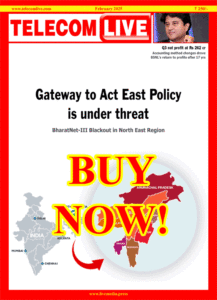Editorial – February 2020
DoT has issued absurd notices of demand of Rs 265,061 crore to non-telecom PSU companies. DoT wants Rs 1.73 lakh crore from GAIL India Ltd for IP-II authorisation, Rs 48,489 crore from Oil India for NLD license, Rs 22,063 crore from Power Grid for Universal License-Internet Service license, Rs 15,020 crore from Gujarat Narmada Valley and the list goes on.
GAIL’s main business is transporting and marketing of natural gas. Yes, it has laid optical fiber along its gas pipeline and uses it for its own communication needs and also leases out to other users. But, DoT wants to club GAIL’s revenue from gas business with OFC leasing, it is DoT’s interpretation of accounting. The absurdity verges on foolishness and it is done repetitively. Oil India Limited has said that it made only Rs 1.47 crore on its NLD licence that it took primarily to establish supervisory control and data acquisition system for running its pipeline network. It got slapped with an amount twice its networth.
So why did DoT raise these demands. Is there really any equivalence between UASL, IP-II, ISP, and NLD license conditions? Is the DoT scuttling its own case in the AGR matter and giving a lifeline to the telecom operators who have to pay up and whose review petitions have been dismissed by the apex court.
Meanwhile, the practices of e-com platforms have come under fire from Indian trade associations, in particular from mobile handset retailers. Top brands blinked after the All India Mobile Retailers Association (AIMRA) put them on notice. Xiaomi, Samsung and OnePlus were communicated that unless online discounting is controlled, retailers would deduct the difference and sell at online prices or worse even consider boycotting the brands altogether.
As per IDC, online accounts for more than 45 per cent of total smartphone sales in India. So in the new year both Xiaomi and Samsung, India’s top two smartphone brands talked parity and assured the trade that both online and offline channels will have an equitable share of business for their future product launches. They assured that forthcoming models would be launched both online and offline at the same time, and with the same price sticker.
Recently, the Competition Commission of India (CCI) in a report has asked e-commerce platforms to be more open about how they rank products and services in response to customer searches and to ensure the genuineness of user reviews. The CCI has proposed a set of self-regulation guidelines for the e-commerce sector and asked the platforms to have transparent policies on discounts and on what they do with the data collected on transactions.


